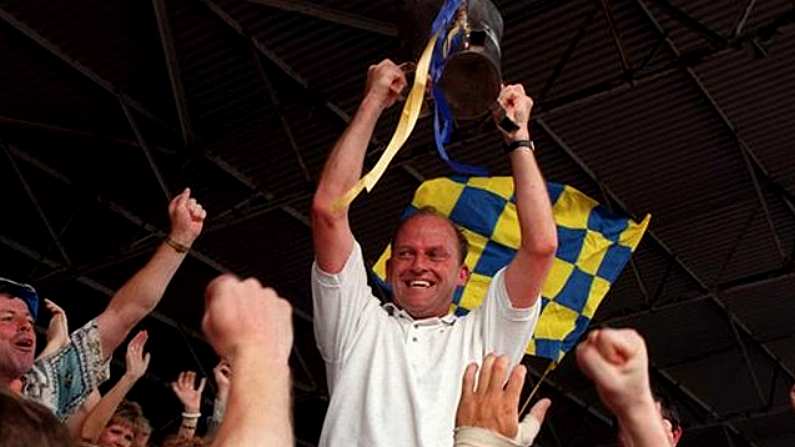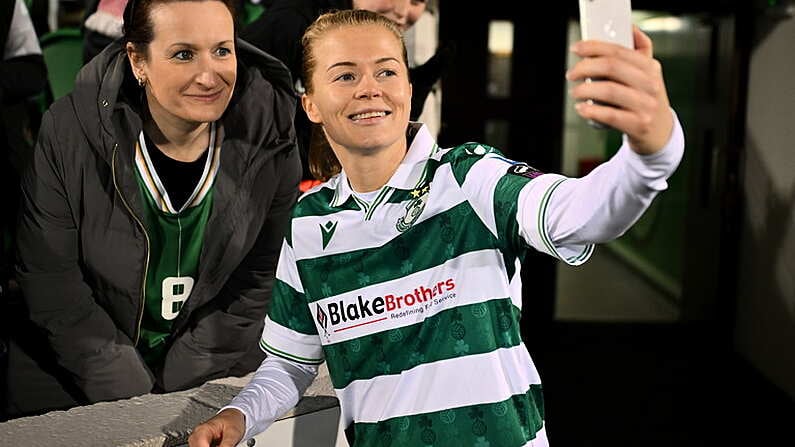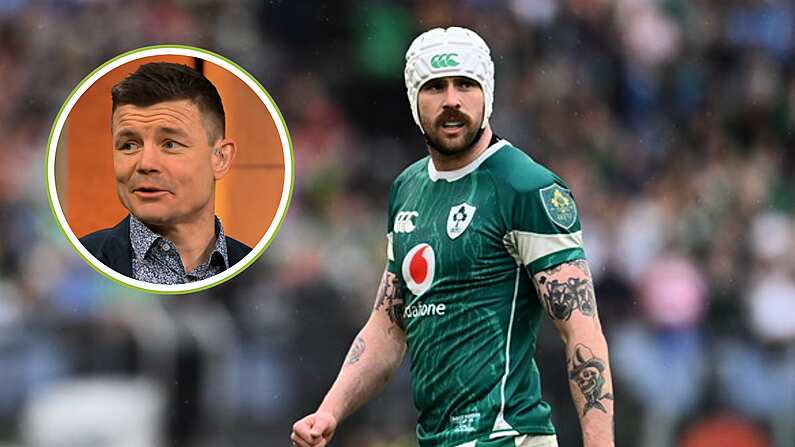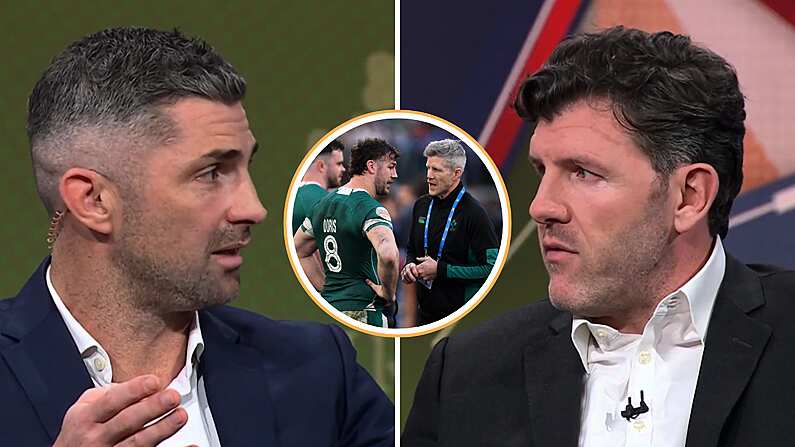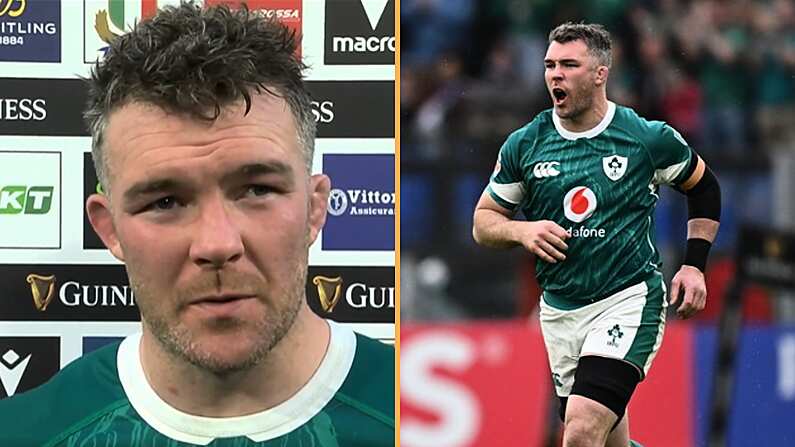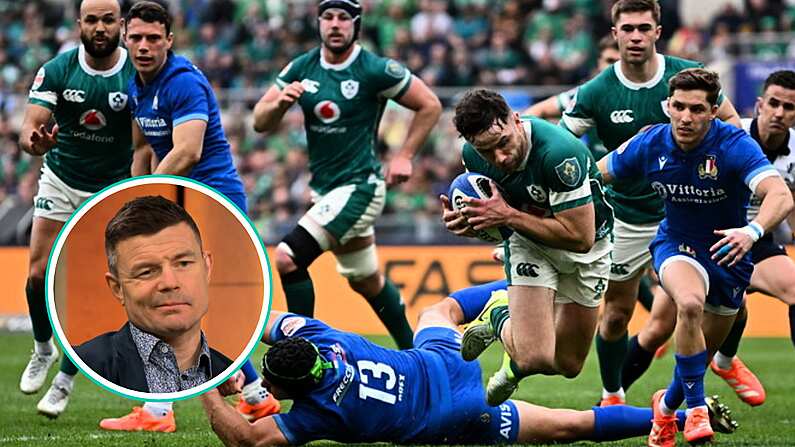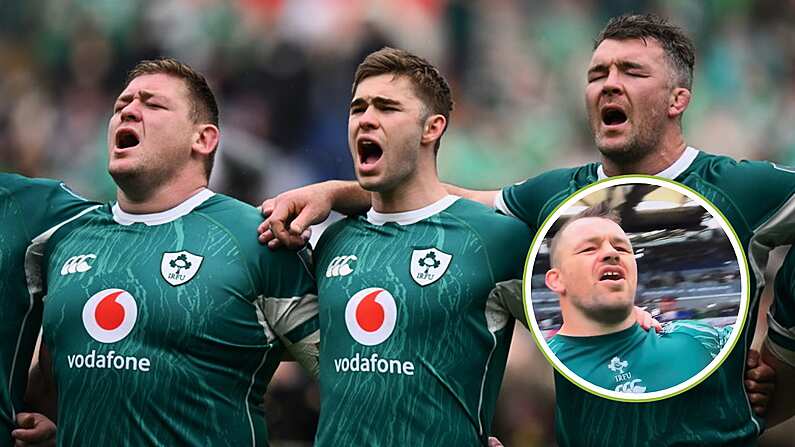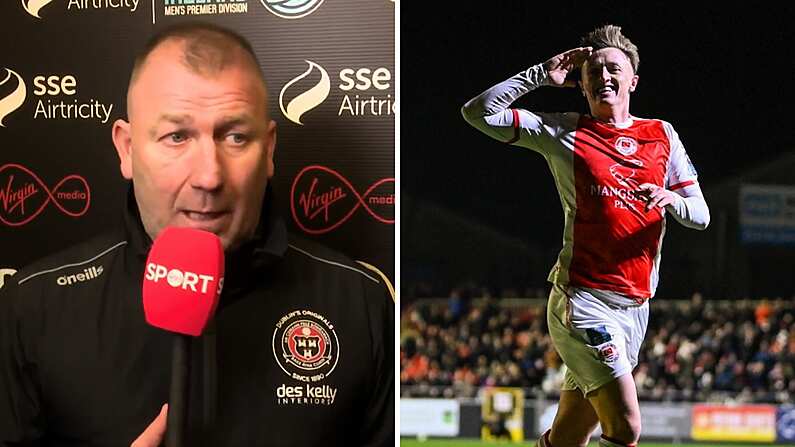In the giddy aftermath of the game in Chicago on Saturday night, Enda Kenny's tweet captured the new spirit of passionate optimism that was engulfing the nation.
Chicago Cubs win after 108 years.
Ireland win after 111 years.
Mayo to win after 66 years.
Let's do it lads!#IREvNZL
— Enda Kenny (@EndaKennyTD) November 5, 2016
There is a slight problem with the tweet. Going by the mathematical sequence implied above, Mayo should expect Sam to finally arrive in 2065. It will surely be one hell of a celebration but it might be a bit too late for many Mayo fans.
Interestingly, the tweet resulted in a brief online convo with Welsh First Minister Carwyn Jones, who congratulated Ireland on their win but failed to say anything positive about Mayo.
Here, inspired by the Chicago Cubs and the Irish rugby team, we give you six sporting curses that were finally broken.
Clare win Munster 1995
"It hadn't been All-Ireland finals that we were losing." - Anthony Daly.
Clare's wait for an All-Ireland title was longer than their wait for a Munster championship but there wasn't anything like the same yearning for the former.
It's a modern cliche of sports fandom that it's the hope that kills fans more than the despair.
No one in Wicklow or Carlow is going around torturing themselves on account of the fact that they're not winning any All-Ireland titles. All bar the most pathologically optimistic have accepted that it won't happen in their lifetime.
There's literally no hope of it happening and so people have cheerfully moved on. Those still involved have re-calibrated their expectations for what constitutes success. (Though, not so much that they've seen the light on a properly designed second tier competition - which still provokes furious opposition.)
Likewise, in Clare in the long decades between the mid-30s and the mid-90s, hurling folk had re-calibrated their expectations.
The Liam McCarthy was an item of silverware which wasn't even up for discussion. It was replaced by a near-fixation with the Munster championship. A fixation which was intensified by the unending series of near-misses and final losses.
Between 1938 and 1994, they lost 12 Munster Finals in a row, some heavily, some narrowly. There were bitter what might have beens. The national league winning team of the late 1970s were possibly the second best team in the country but had the misfortune to run into a historically great Cork team.
"I would always say that the '95 Munster Final was my happiest day with Clare, above the All-Irelands even, because, personally, I suppose I'd never even dreamt of All-Irelands. It was to win the Munster Final. It was to get to a Munster Final and to win it. So, it was the real realising of a dream that day."
Sean McMahon
During those years, the folklorists who work in the RTE GAA department told us that Clare were cursed by a woman called Biddy Early, a 19th century herbalist who was accused of witchcraft by her credulous neighbours.
Whatever about the accusations of witchcraft, Biddy was patently a woman with great powers of clairvoyance. For she managed to place a fearsome hex on the Clare hurlers at least a decade before the Gaelic Athletic Association was founded.
We say this with some confidence as she died in 1874. Essentially, she placed a curse on the Clare hurling team before there was a Clare hurling team. This is a woman to be feared.
The Clare team that reached the Munster Final in 1995 should have been a nervous wreck, anxious to avoid a third successive loss.
On arriving in the dressing rooms in Thurles before the '95 final, Ger Loughnane famously strode towards Micheal O'Muircheartaigh, who was milling around the tunnel, gestured to his players and said "Look at them. We can't lose."
Boston Red Sox win the World Series 2004
A curse even more famed than the Chicago Cubs hex, principally because it centred around Babe Ruth. People who think GAA curses are rough should get a load of baseball curses.
86 years! 108 years!
In 1918, the Boston Red Sox, then one of the trophy laden outfits in baseball, offloaded their star player Mr. Ruth into the hands of their enemies in New York.
For this gratuitous offence against the Gods of baseball, they were punished with 86 years of torment. As in Mayo, the notion that there was a curse at all was a modern invention. (People often forget that Mayo actually went 38 years without even reaching an All-Ireland final after '51.)
The 'curse of the bambino' was inspired by the 1986 World Series to the New York Mets, one of the most unbearable final defeats in any sport ever. Leading 3-2 heading into Game 6, they had victory in their grasp when Bill Buckner allowed a 'ground ball' to slip under his hands in the tenth inning. They lost Game 7 after blowing an early lead.
Boston sports fans tried all manner of medieval sounding solutions to excise the curse. Italian priests were invited over to Fenway Park to purify the ground. An ex-player Bill Lee joked that they should exhume Babe Ruth's body, bring it back to Boston and publicly apologise for trading him in 1918.
The Michael Lewis book Moneyball contends that it was hard-headed numbers that broke the curse in the end. John W Henry's team led by GM Theo Epstein - and not Billy Beane - recruited well and put together a Red Sox team which reached the American League Championship Series.
There, they seemed to be well in the process of getting spanked by the Yankees again. Losing 3-0, the game was deemed all over. ESPN documentaries have been made about the 4-3 reversal.
The handy 4-0 World Series victory over the St. Louis Cardinals was an anti-climax by comparison.
New York Rangers 1994
Connoisseurs of the 30 for 30 series won't need to be told that the New York Rangers finally clinched the Stanley Cup in the week when Ireland played Italy in the Giants Stadium.
For 54 years, they'd been outperformed in the hunt for silverware by neighbours the New Jersey Devils and the New York Islanders.
In fitting style, the series went to a seventh game with the Rangers pipping the Vancouver Cannucks 3-2 in the game and 4-3 in the series.
The indoor venue added to the magic. The roar which greeted he final whistle came close to blowing the top off Madison Square Garden.
It was, as Ireland fan Gary Spain has disclosed to us, hard for New Yorkers to think to hard about soccer during the World Cup after that.
"No more curses. These people have waited a long time!" screamed the commentators.
All of Cleveland 2016
In the US, it's never long before a sporting drought gets rebranded as a curse. The coldly rational English (well, Brexit) never think to blame the occult whenever a team goes a long time without winning. If they did, they'd be wanting to know what dark forces Bobby Moore and co. roused when the brought the Jules Rimet on a tour around London. In English soccer, the rich get richer and money is such a dominant factor that no one ever needs to ponder such mystical forces.
The Cleveland sports curse is the proud possessor of its own wikipedia page. A sure sign that a sporting curse has become part of popular culture.
Despite the various equalisation measures employed in US sport which ensure that silverware gets spread around a bit, none of Cleveland's sports teams managed to win a major US sports championship between 1964 and 2016. That's across the sports of baseball, American football and basketball.
It was the football team, the Browns, who won the '64 championship, before there even was a Super Bowl. In fact, the Browns have never even reached a Super Bowl, occasionally losing a couple of AFC championship games.
The baseball team, the Cleveland Indians added to their store of heartbreak last night. In all the hoopla about the Cubs, it was rather forgotten that the Indians aren't exactly regulars at the winners' enclosure.
But 2016 was the nonetheless the year of deliverance for Cleveland with local boy LeBron bringing home the bacon in the NBA finals. They were soundly beaten by the Golden State Warriors last year but returned to win a dramatic 4-3 win in the finals this year.
We were treated to tears of joy from their galactico and a storybook finish.
"Cleveland is a city of champions once more."
Galway win All-Ireland 1980
The one-woman curse machine that was Biddy Early was also blamed for Galway's woes during the 50s and 60s and 70s. Interestingly, no one has held her responsible for what's happened since 1988.
Galway was a place where the game of hurling took root early.
In 1884, Michael Cusack brought his Phoenix Park-based 'Dublin Metropolitan' hurling team down to Ballinasloe to play a match against an East Galway outfit called 'Killimor.'
This was before the founding fathers had even met in Hayes's Hotel and the rules of this game were still a matter of some dispute. The Galway lads had a different understanding of the rules to the genteel Dubliners. In Ballinasloe, there was a greater degree of tolerance for rough-house tactics. Let's say, they played on the edge.
Cusack, who in the years preceding boasted that hurling was "invented by the most sublimely energetic and warlike race on the planet", went whingeing to the Irish Times of all papers, saying that the Killimor fellas had "slashed in reckless and savage manner." A depressing show of unmanliness from the President of the GAA.
The spirit of Killimor certainly lives on in the Galway county final every year.
In the 20th century, Galway were in the wilderness. As Cyril Farrell wrote, they were "cut off from the game by hurling and geography."
When the football team swept all before them in the 60s, the hurlers were suffering in Munster, losing their first match more or less every year. (They knocked Clare out in 1961 and that was it.)
Between 1923 and 1980, there were numerous instances of bad luck with the county's critics alleging that they developed a victim complex. 1953 is usually cited at this point. Galway beat Kilkenny in the All-Ireland semi-final and looked to be going well against Cork in the final when Christy Ring is alleged to have broken star player Mickey Burke's arm.
Cork won narrowly and Ring was apparently physically attacked by a party of Galway players and supporters in a Parnell Street hotel that night.
That week, lore has it that a copy of a Cork newspaper (don't know which one) was ritualistically burned in Eyre Square - like a Salman Rushdie novel in Bradford.
In the mid-70s, Galway emerged with a strong team and reached a couple of finals before the glorious day in 1980 when Limerick were beaten by four points.
Joe Connolly thought of the emigrants in his emotive address.
"Is iontach an l· innui a bheith mar Gaillimhach. T· daoine ar ais i nGaillimh agus gliondar in a gcroi. Ach freisin caithfimid cuimhneamh ar dhaoine i Sasana, i Meiriceá, ar fuaid na tíre. Agus tá said, b’fhéidir, ag caoineadh anois i láthair."
Leitrim winning Connacht in 1994
"There will be many a Leitrim man looking down from the veranda of heaven right now" - Micheal O'Muircheartaigh
Leitrim's curse isn't really mythological in nature. It is strictly demographic. As in there are hardly any people in the place.
It's arguable that Leitrim should have mined more than one provincial title from their early 1990s team. They kept stumbling against mediocre Roscommon teams when victory was there to be grasped.
Neither Galway or Mayo were too hot in the 1990-94 period.
Mayo were distracted by internal upheaval and dumb county board managers, while Galway football seemed to be simply awash with apathy. There was no life in the scene and the home team's support was often outnumbered in Tuam Stadium.
Leitrim finally got over Roscommon with a one point win in Hyde Park. Next up were Galway in Carrick. Historically, this was a desperate match-up for Leitrim, but they had beaten Galway in Tuam the year before.
A win after a replay took them to the final against Mayo, who seemed less energetic and primed than usual. The current generation of Mayo fans would gag at the thought of them being outnumbered in a Connacht final. Ger Canning remarked that the Mayo players were greeted by polite applause. Clearly, the All-Ireland humiliation against Cork knocked some life out of them.
Despite an ferocious goalkeeping clanger early on, which might have convinced a more mentally frail outfit that the Gods had no time for them, they powered past Mayo, who were flattered to only lose by two points.
Darcy lifted the Nestor Cup with the last Leitrim captain to win, the very elderly Tom Gannon. Very elderly indeed.
As Declan Darcy observed:
"I remember getting squeezed to death by my father. His emotions were unbelievable. A lot of people used to ask him where he was from and he'd say 'west of the Shannon' and he'd maybe hold back on the Leitrim thing for fear of people slagging him about it. But that was a day when an awful lot of Leitrim people could stand proud and he typified that. "
Read more: The IRA, The Haka, And Giving The Finger: Most Memorable Moments From Ireland v New Zealand

